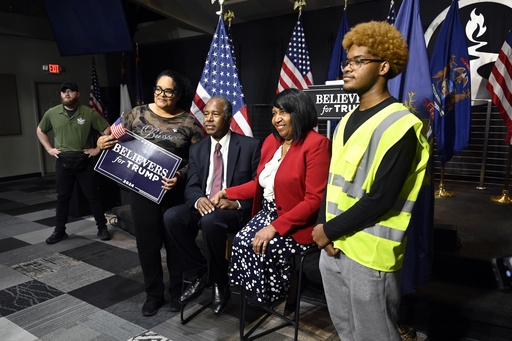
LIVONIA, Mich. — In front of a captivated audience at a Detroit-area chapel, Marlin J. Reed, a pastor from New Wine Glory Ministries, proclaimed a divine mandate for attendees to support Donald Trump in the upcoming election. During an event hosted by Trump’s campaign, Reed encouraged the crowd to confront what he described as “darkness” and “lies” in society, declaring that they would not allow their rights and freedoms to be taken away. His fiery address, advocating for active participation in the political arena, ignited applause and cheers from those present. “We are not going to lie down; we will stand and fight,” he insisted, even suggesting that they would resist to the point of war if necessary.
The Trump campaign has effectively merged far-right political ideologies with evangelical Christianity, seeking to galvanize support from this substantial voter base in key battleground states. They have introduced initiatives such as “Believers for Trump,” which focuses on mobilizing congregations through calls and interactive sessions with conservative religious leaders. Trump is slated to hold another event soon, where he will engage with supportive pastors as part of his outreach strategy. Within the initiative, there’s also a concerted effort to reach out to Black voters, a demographic that typically leans Democratic, with various influential Black voices, including Ben Carson, a notable Trump ally, emphasizing the importance of confronting what he termed “corrupt” politics.
The “Believers for Trump” program gained traction during Reed’s event, which featured a mix of Black speakers advocating for a Christian United States. Pastor Lorenzo Sewell highlighted the necessity of retaining a Christian identity in America. Meanwhile, Democrats are also ramping up their engagement with churchgoers, particularly through initiatives like “Souls to the Polls,” which has a rich history in mobilizing Black voters, particularly during election seasons.
As part of the Democrats’ outreach, a recent event featuring civil rights activist Martin Luther King III aimed to rally support for Vice President Kamala Harris and to critique Trump’s impact on African American communities. Over the course of this month, Harris has made appearances in Black churches to promote voter turnout, furthering the dialogue surrounding faith and political engagement in the upcoming elections.
With church attendance declining in many areas, the intersection of faith and politics appears more intertwined than ever. As Reed concluded his event, he noted the backlash he received for mixing politics with worship. He claimed he intentionally avoided registering his church as a tax-exempt organization to freely express his views.
Trump, who once faced skepticism from evangelical leaders, now enjoys strong support among conservative Christians, who see him as a defender of religious liberties. This union has transcended mere political support, as Trump’s rallies often feature Christian symbols and messages that resonate deeply with his followers. His campaign has rolled out a program called “Believers and Ballots,” aiming to enhance voting participation through training church leaders to coordinate outreach efforts.
Despite these initiatives, Trump’s campaign has stumbled on occasion, particularly in its sensitivity to religious sentiments. His missteps include controversial social media posts and misrepresentations of support among certain Black pastors. Additionally, his comments suggesting that Christian voters would not need to vote again if he’s elected faced significant backlash.
Polling data indicates that while Trump retains overwhelming support among white evangelical Christians and white Catholics, he struggles to connect with other demographics, including Hispanic Catholic voters, mainline Protestant communities, and minority faith groups. Critics among the evangelical community are stepping up to promote alternative choices, such as Evangelicals for Harris, as they attempt to sway their peers to consider other candidates.
The Livonia gathering maintained a focus on cultural issues resonant with religious conservatives, although some of the discussions diverged from scriptural references. Carson stirred up contentious dialogue by alleging that unlawful immigrants were deliberately sent to the U.S. as threats, prompting further polarized perspectives on societal issues. As differing visions of America loom, faith continues to play a pivotal role in shaping the political narrative leading into the elections.
